Related Research Articles
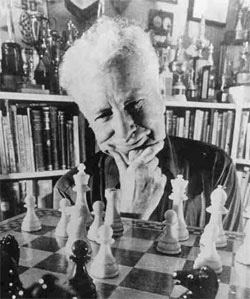
The Elo rating system is a method for calculating the relative skill levels of players in zero-sum games such as chess or esports. It is named after its creator Arpad Elo, a Hungarian-American physics professor.

There are various systems of Go ranks and ratings that measure the skill in the traditional board game Go. Traditionally, Go rankings have been measured using a system of dan and kyu ranks. Especially in amateur play, these ranks facilitate the handicapping system, with a difference of one rank roughly corresponding to one free move at the beginning of the game. This system is also commonly used in many East Asian martial arts, where it often corresponds with a belt color. With the ready availability of calculators and computers, rating systems have been introduced. In such systems, a rating is rigorously calculated on the basis of game results.
A ladder tournament is a form of tournament for games and sports. Unlike many tournaments, which usually have an element of elimination, ladder competitions can go on indefinitely. In a ladder competition, players are listed as if on the rungs of a ladder. The objective for a player is to reach the highest rung of the ladder.
The Glicko rating system and Glicko-2 rating system are methods of assessing a player's strength in zero-sum two-player games. The Glicko rating system was invented by Mark Glickman in 1995 as an improvement on the Elo rating system and initially intended for the primary use as a chess rating system. Glickman's principal contribution to measurement is "ratings reliability", called RD, for ratings deviation.
Call of Duty is a military first-person shooter video game series and media franchise published by Activision, starting in 2003. The games were first developed by Infinity Ward, then by Treyarch and Sledgehammer Games. Several spin-off and handheld games were made by other developers. The most recent, Call of Duty: Black Ops 6, was released on October 25, 2024.
TrueSkill is a skill-based ranking system developed by Microsoft for use with video game matchmaking on the Xbox network. Unlike the popular Elo rating system, which was initially designed for chess, TrueSkill is designed to support games with more than two players. In 2018, Microsoft published details about an extended version of TrueSkill, named TrueSkill2.
A chess rating system is a system used in chess to estimate the strength of a player, based on their performance versus other players. They are used by organizations such as FIDE, the US Chess Federation, International Correspondence Chess Federation, and the English Chess Federation. Most of the systems are used to recalculate ratings after a tournament or match but some are used to recalculate ratings after individual games. Popular online chess sites such as Chess.com, Lichess, and Internet Chess Club also implement rating systems. In almost all systems, a higher number indicates a stronger player. In general, players' ratings go up if they perform better than expected and down if they perform worse than expected. The magnitude of the change depends on the rating of their opponents. The Elo rating system is currently the most widely used. The Elo-like ratings systems have been adopted in many other contexts, such as other games like Go, in online competitive gaming, and in dating apps.

The IW engine is a game engine created and developed by Infinity Ward for the Call of Duty series. The engine was originally based on id Tech 3. Aside from Infinity Ward, the engine is also used by other Activision studios working on the series, including primary lead developers Treyarch and Sledgehammer Games, and support studios like Beenox, High Moon Studios, and Raven Software.

Dota 2 is a 2013 multiplayer online battle arena (MOBA) video game by Valve. The game is a sequel to Defense of the Ancients (DotA), a community-created mod for Blizzard Entertainment's Warcraft III: Reign of Chaos. Dota 2 is played in matches between two teams of five players, with each team occupying and defending their own separate base on the map. Each of the ten players independently controls a character known as a hero that has unique abilities and differing styles of play. During a match, players collect experience points (XP) and items for their heroes to defeat the opposing team's heroes in player versus player (PvP) combat. A team wins by being the first to destroy the other team's Ancient, a large durable structure located in the center of each base.
In multiplayer video games, matchmaking is the process of connecting players together for online play sessions.
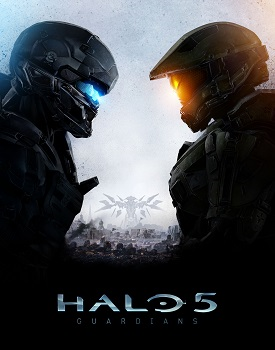
Halo 5: Guardians is a 2015 first-person shooter video game developed by 343 Industries, published by Microsoft Studios, and released worldwide for the Xbox One game console on October 27, 2015. The plot follows two fireteams of human supersoldiers: Blue Team, led by Master Chief, and Fireteam Osiris, led by Spartan Locke. When Blue Team goes absent without leave to track down the artificial intelligence construct Cortana, Master Chief's loyalty is called into question and Fireteam Osiris is sent to retrieve him.

Vainglory is a free-to-play multiplayer online battle arena (MOBA) video game, developed and published by Super Evil Megacorp for iOS, Android and PC. As many games in its genre, Vainglory's gameplay focuses on player versus player battles, with players split into two teams of three or five with the ultimate goal of destroying the opposing team's base. The game was released for iOS on November 16, 2014, after being soft-launched for over half a year, with the Android version being released on July 2, 2015. A Mac and Microsoft Windows version of the game was released in July 2018. Through cross-platform play, players on all four platforms can play together simultaneously.
Elo hell is a video gaming term used in MOBAs and other multiplayer online games with competitive modes. It refers to portions of the matchmaking ranking spectrum where individual matches are of poor quality, and are often determined by factors such as poor team coordination which are perceived to be outside the individual player's control. This ostensibly makes it difficult for skilled players to "climb" up the matchmaking ranking, due to the difficulty of consistently winning games under these conditions. Its existence in various games has been debated, and some game developers have called it an illusion caused by cognitive bias.

Call of Duty: Modern Warfare is a 2019 first-person shooter video game developed by Infinity Ward and published by Activision. Serving as the sixteenth overall installment in the Call of Duty series, as well as a reboot of the Modern Warfare sub-series, it was released on October 25, 2019, for PlayStation 4, Windows, and Xbox One.

Dota Underlords is a 2020 auto battler game developed and published by Valve. The game is based on a popular Dota 2 community-created game mode called Dota Auto Chess, which was released in January 2019. Dota Underlords first released in early access in June 2019 before officially releasing on February 25, 2020, for Android, iOS, macOS, Linux, and Windows. The game is free to play and features cross-platform play.

Call of Duty: Warzone was a 2020 free-to-play battle royale first-person shooter game developed by Raven Software and Infinity Ward and published by Activision. It was released on March 10, 2020, for PlayStation 4, Windows, and Xbox One as part of Call of Duty: Modern Warfare (2019) and was subsequently connected to Call of Duty: Black Ops Cold War (2020) and Call of Duty: Vanguard (2021), but did not require purchase of any of the aforementioned titles. Warzone allowed online multiplayer combat among 150 players and featured both cross-platform play and cross-platform progression between the three aforementioned titles.
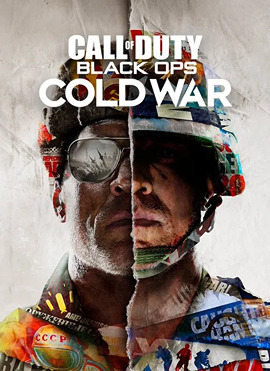
Call of Duty: Black Ops Cold War is a 2020 first-person shooter game co-developed by Treyarch and Raven Software and published by Activision. It is the seventeenth installment of the Call of Duty series and is the sixth entry in the Black Ops sub-series, following Call of Duty: Black Ops 4 (2018). Set in 1981, Black Ops Cold War's single-player story follows CIA operative Russell Adler and his team of agents as they hunt down a Soviet spy named Perseus. As with previous Call of Duty titles, the game also includes a multiplayer component and the cooperative Zombies mode.
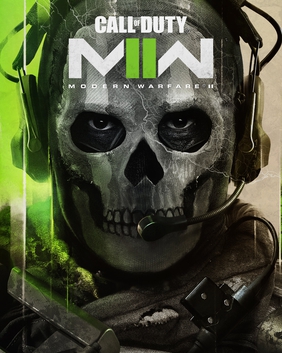
Call of Duty: Modern Warfare II is a 2022 first-person shooter game developed by Infinity Ward and published by Activision. It is the nineteenth installment of the Call of Duty series, serving as a sequel to the 2019 reboot of the Modern Warfare sub-series. The game was released on October 28, 2022, for PlayStation 4, PlayStation 5, Windows, Xbox One, and Xbox Series X/S.
Boosting is a method by which low-ranked players in online multiplayer games, such as first-person shooters and massively multiplayer online role-playing games (MMORPGs), hire more skilled players to artificially increase their gaming account rank or winning positions. Boosting is rarely allowed as part of a game's terms of service, and while legal in most countries, boosted accounts are sometimes banned or reset if detected. In South Korea, it was declared a criminal offense in 2018, leading various companies to tighten their policies on it. The act of boosting negatively impacts game balance by allowing unskilled players to lower the quality of high-ranking play, making the game less viable and enjoyable. However, the extent of the crackdown on boosting has been debated, with some calling it not severe enough to merit criminal penalties.
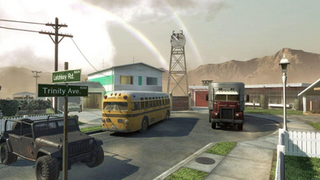
"Nuketown" is a multiplayer map in the Call of Duty series of first-person shooter video games published by Activision. Set in a nuclear test town in the deserts of Nevada, the map features two symmetrical sides that are split down the middle by a road. Each side has a two-story house with a backyard, and the road has vehicles that provide additional cover. The map is very small, and combat is often frantic due to its small size. At the end of each multiplayer game played on the map, a nuclear bomb is dropped on the site, obliterating it.
References
Citations
- ↑ Elo 1986, p. x.
- ↑ Herbrich, Minka & Graepel 2007, p. 7.
- ↑ Perry, Douglass (October 28, 2005). "Live in the Next Generation: The TrueSkill System". IGN . Retrieved June 1, 2023.
- ↑ Makedonski, Brett (October 31, 2014). "Master Chief Collection's multiplayer ranking system is just like Halo 2's". Destructoid . Retrieved June 1, 2023.
- ↑ Chan, Norman (June 24, 2008). "Carmack frees Quake". GamesRadar+ . Retrieved June 1, 2023.
- ↑ Biessener, Adam (October 13, 2010). "Valve's New Game Announced, Detailed: Dota 2". Game Informer . Archived from the original on October 16, 2010. Retrieved June 1, 2023.
- ↑ Grant, Christopher (September 3, 2010). "Call of Duty: Black Ops multiplayer takes aim at cheaters, looks to recruit more players". Engadget . Retrieved June 1, 2023.
- ↑ Zook 2019, p. 36.
- ↑ Petitte, Omri (October 26, 2012). "Call of Duty: Black Ops 2 uses ping and latency "exclusively" for multiplayer matchmaking". PC Gamer . Retrieved June 1, 2023.
- ↑ Valenta, Nate (August 8, 2014). "Matchmaking Design in Heroes of the Storm". Blizzard Entertainment . Retrieved June 1, 2023.
- ↑ Glickman 2001, p. 673-689.
- ↑ Dangauthier et al. 2008, p. 931-938.
- ↑ Menke, Reese & Martinez 2006, p. 1.
- ↑ Chen et al. 2016, p. 1.
- ↑ Chen & Joachims 2016, p. 1.
- ↑ Davison, Ethan (May 27, 2022). "Video game developers want fair online games. Some players really don't". The Washington Post . Retrieved June 1, 2023.
- ↑ Winslow, Levi (October 27, 2022). "Call Of Duty: Modern Warfare 2 Fans Can't Believe They Have To Play In Fair Matches". Kotaku . Retrieved June 1, 2023.
- ↑ Kelly, Paul (February 15, 2023). "Destiny 2 PvP exploit sees skill-based matchmaking completely negated". PCGamesN . Retrieved June 1, 2023.
Works cited
- Chen, Shou; Joachims, Thorsten (2016). "Modeling Intransitivity in Matchup and Comparison Data" (PDF). Proceedings of the Ninth ACM International Conference on Web Search and Data Mining. pp. 227–236. doi:10.1145/2835776.2835787. ISBN 978-1-4503-3716-8 . Retrieved June 1, 2023.
- Chen, Zhengxing; Sun, Yizhou; El-nasr, Magy; Nguyen, Truong-Huy (2016). "Player skill decomposition in multiplayer online battle arenas". Meaningful Play. arXiv: 1702.06253 . Retrieved June 1, 2023.
- Dangauthier, Pierre; Herbrich, Ralf; Minka, Tom; Graepel, Thore (January 2008). "TrueSkill Through Time: Revisiting the History of Chess" (PDF). Advances in Neural Information Processing Systems . Retrieved June 1, 2023.
- Elo, Arpad (1986). The Rating of Chess Players, Past and Present. Arco. ISBN 0-668-04721-6.
- Glickman, Mark (2001). "Dynamic paired comparison models with stochastic variances" (PDF). Journal of Applied Statistics . 28 (6): 673. Bibcode:2001JApSt..28..673G. doi:10.1080/02664760120059219. S2CID 16101322 . Retrieved June 1, 2023.
- Herbrich, Ralf; Minka, Tom; Graepel, Thore (2007). "TrueSkill: A Bayesian Skill Rating System" (PDF). Advances in Neural Information Processing Systems . 20. Retrieved June 1, 2023.
- Menke, Joshua; Reese, Shane; Martinez, Tony (2006). "Hierarchical models for estimating individual ratings from group competitions". American Statistical Association . Retrieved June 1, 2023.
- Wallner, Günter, ed. (2019). Data Analytics Applications in Gaming and Entertainment. CRC Press. ISBN 9781000001860.
- Zook, Alex. "Chapter 3: Building Matchmaking Systems". In Wallner (2019).